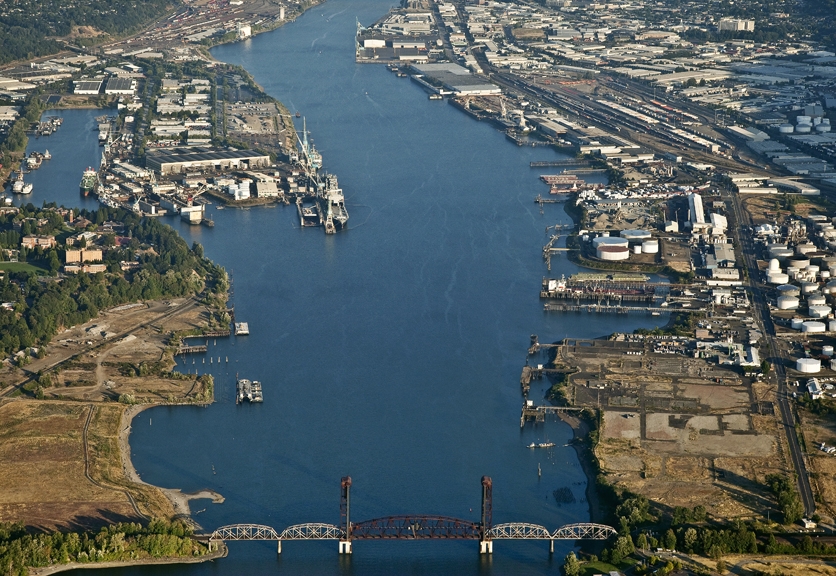Update: 6/8/2016: The U.S. Environmental Protection Agency released its Superfund cleanup proposal calling for a combination of dredging and capping and “natural recovery” to clean the Willamette River’s Superfund site.
Original article:
During a breakout session at the Oregon Leadership Summit earlier this week, business and legislative leaders called for a practical, cost-effective solution to cleaning up the Superfund zone.
The EPA designated a polluted, 10-mile section of the Willamette River south of the Fremont Bridge a national Superfund site back in the year 2000. Much of the pollution stems from industrial pollutants dumped into the river as long as a century ago.
Portland city commissioner Nick Fish said the EPA is expected to release its preferred plan in March, followed by a 60-day public review and comment period. The agency will come to a record of decision by the end of 2016.
“If we can’t reach an agreement, if the view from community partners is that nothing is good enough, there will be another 15 years of Superfund — the process will shift to the courts and be litigated,” Fish said.
Fish was likely referring to the Portland Harbor Community Advisory Group, a coalition of labor, tribal and environmental organizations including the Sierra Club and Willamette Riverkeeper that has been highly critical of existing cleanup proposals.
Fish likened the compromise to the $1 billion-plus Big Pipe, which the city built after the EPA ordered officials to take action on sewage spilling into the Willamette.
“We had a 100-year event in metro area in the past week,” Fish said, referring to the massive rainfall that deluged the region, sweeping sewage into the river. “What if, 15 years ago, we had community voices that said we should build a big pipe that covers every single contingency? We couldn’t. So we built a system that [addressed] 94% of our needs. If we set the bar so high it’s unachievable, then it means no deal.”
Congressman Kurt Schrader (D-Oregon) said the harbor is cleaner than people think it is.
“As a vet, a scientist, I want to use good information to make decisions,” Schrader said. “To be honest: This harbor is safer than many sites that have been cleaned. You can swim in the river. You can eat that fish. The only risk is if you are fishing for nonnative fish, five to six times a day. There aren’t too many people like that — maybe our friends in tribes would disagree.”
Six native tribes have the legal right to participate in the Superfund cleanup process.
Studies show that much of the site has been cleaned up through natural recovery processes, Schrader said. “I want to make sure that [natural recovery] is part of the solution.”
In October, the community advisory group lambasted EPA proposals for “monitored natural recovery” in part or all of the superfund site.
Panelist Sandra McDonough, president of the Portland Business Alliance, noted the predicted costs of cleanup range from close to $1 billion to more than $2 billion.
“We all want a clean river. We all want an agreement that everyone can get to and that moves us forward. It would be very sad for all of us if we spend another 15 years talking about this.”
The costs could be staggering, McDonough said.
“The question is who would pay for it. We are hearing from some that big oil companies would pay for it. But there are potentially 150 responsible parties and those costs are shared broadly. A lot of the initial companies that created issues aren’t in existence anymore. We have to understand we’re talking about the cost to utilities, our water utilities. We have to understand those costs will be passed on to customers.”
The city of Portland is one of the entities on the hook for the harbor cleanup. As Fish explained, the city has historically owned land along the river and “runs conduits into which people have put allegedly bad things that go in the river.”
Panelist Dick Pederson, Director of the Oregon Department of Environmental Quality, said there are “hot spots” of contamination and those spots need to be addressed.”
Once the EPA issues its record of decision, remedial design will take place and “we can actually get into the river and on with cleanup,” he said.
All of the panelists emphasized the value of the port as the region’s economic engine. “The port has gone through pretty horrendous experiences that has impacted thousands of jobs, thousands of farmers,” Schrader said. The wrong solution could “stop economic recovery dead in its tracks. Forty thousand port jobs could go away in a heartbeat.”
Despite foregrounding ominous business impacts, panelists said the discussion around Portland Harbor cleanup has been unfairly characterized as a “blue-green fight.”
Members of environmental and community groups calling for more aggressive cleanup solutions did not appear to be present in the audience.



